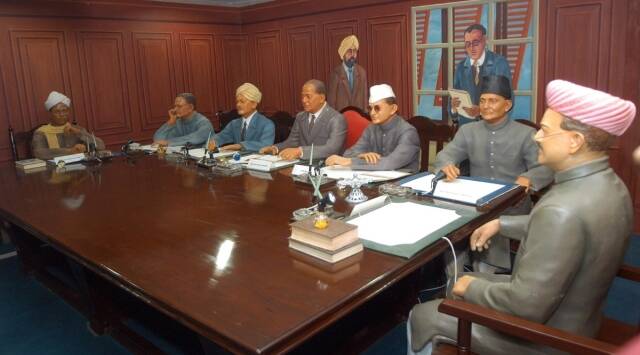“Horrible” material, Wikipedia sources: Dispute over the improvement of the Parliament Museum

“Horrible quality” of material; “ashamed” that references are taken from Wikipedia; no information about who the experts are — the ambitious plan to improve the existing Parliament Museum has run into trouble.
The Deccan Era looked at official records and found that the museum’s boss, the Lok Sabha Secretariat, and the “content creator,” the National Museum Institute (NMI), a deemed university under the Union Ministry of Culture, had a lot of disagreements.
All of this is happening with only four months left until the new museum opens on August 15.
The nearly Rs 15-crore project is meant to update and modernise the current Parliament Museum, which was opened on August 15, 2006, by President A P J Abdul Kalam at the Parliamentary Library Building. As the museum waits for its improvement, all of the displays have been taken down.
The new building is supposed to have a two-story museum with six sections: Seeds of Democracy, Constitutional History of India, The Structural Strength of India, Indian Democracy in Action, Successful Running of India’s Democracy, and The Parliament Building: Past, Present, and Future.
A top official from the Ministry of Housing and Urban Affairs who knew about the Central Vista plan said that this Parliament Museum was not part of the master plan for redeveloping Central Vista.
NMI was given the job of “conceptualising, creating, and curating” material in April of last year. Based on information from NMI, the Rs 14-crore deal to do the upgrade went to a private company in Gurugram called Pan Intellecom.
Sources say that on January 24, 2018, for the theme “Seeds of Democracy,” Pan Intellecom suggested to NMI through historian Makkhan Lal, an ex-AMU professor who has worked at the Prime Ministers’ Museum, that the entrance should show speeches about the roots of Indian democracy by the first Prime Minister Jawaharlal Nehru, Chairman of Drafting Committee of Constitution of India Dr B R Ambedkar, and Prime Minister Narendra Modi.
Lal, who Pan hired, suggested the following excerpts: Modi’s “India is the mother of democracy” speech at Red Fort on August 15, 2017; part of Nehru’s speech in Lok Sabha on March 28, 1957, about why India chose a parliamentary democracy; and an excerpt from Dr Ambedkar’s speech at Constituent Assembly on November 25, 1949, about the history of democracy in India.
In response, on February 9, Manvi Seth, Dean (Academic Affairs) and head of the NMI’s Department of Museology, who was also in charge of the project, wrote to Secretary General of Lok Sabha Utpal Kumar Singh: “It is very important that the narrative and content be treated as sacred and completely objective. No changes (additions or deletions) to the content are to be made by Pan on its own without first consulting NMI and getting their permission.
A top official said that it was clear that NMI thought Pan’s content ideas were getting in their way.
Sources say that on March 24, this year, Lal sent an email to the Lok Sabha Secretariat and copied NMI. In the email, Lal talked about “the horrible quality of content” from NMI and asked NMI to name the people who made the content.
In an email to NMI on April 3, Additional Secretary of the Lok Sabha Secretariat Prasenjit Singh echoed these worries and said, among other things, “NMI is avoiding sharing details of experts.”
Singh also said that “complete templates for the first three themes” were still needed.
A week later, on April 10, NMI sent out links to Wikipedia pages about Mysore, Aundh, Travancore, and Cochin. These articles were used as sources.
This made Lal respond on April 12: “As a historian, I am very upset and ashamed that the Parliament Museum is being put together based on Wikipedia and questionable sources from the internet instead of written sources in the libraries. NMI should be asked to give a list of the names and references of the people who wrote the text and signed the deal. If not, it must be taken out of the project and asked to return the money already taken for it.”
When asked for his opinion, Lal refused.
Harbir Singh Panesar, the Managing Director of Pan Intellecom, said, “We were given five months to finish the project once we got the content, but we haven’t gotten it yet.” I can’t tell you when it will be done until we have all the information we need. The Lok Sabha Secretariat’s Prasenjit Singh was not available to say anything.
When The Indian Express asked NMI’s Manvi Seth about Lal’s answer, she said, “It is completely false to say that a lot of the information in the content provided by NMI came from Wikipedia. Content has been made by doing the study, going on field trips, talking to experts in the field, and looking through old records…The Parliament Museum has been consulted and talked to on a routine basis.”
When asked about Pan’s suggestion about speeches, which NMI turned down, Seth said, “The idea of using quotes and speeches where they are relevant and necessary has always been welcomed.”



